Billy Coffey's Blog, page 31
May 2, 2013
When Mockingbirds Sing
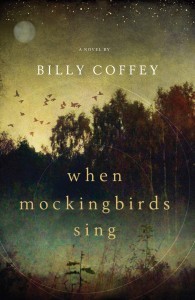 Here’s the thing about writing a book—it’s mostly long and lonely process. Don’t get me wrong, writing is what I do. It’s what I love. And aside from spitting watermelon seeds and going to right field on a curve ball, it’s pretty much the only thing I think I can do well.
Here’s the thing about writing a book—it’s mostly long and lonely process. Don’t get me wrong, writing is what I do. It’s what I love. And aside from spitting watermelon seeds and going to right field on a curve ball, it’s pretty much the only thing I think I can do well.
And it’s worth it. All that long loneliness, I mean. Because if all goes well, at the end of all that sitting down and scribbling out and editing and cutting and shaping is a story you’re proud to share. A story that will entertain you and inspire you. A story that might even make you a little uncomfortable, albeit in a good way.
That’s what has happened with my next novel, When Mockingbirds Sing.
We’re just over a month away from publication. As exciting as the next weeks will be, they also promise to be not unlike all the months spent writing. They’ll be long, no doubt. But maybe not so lonely.
We’re putting together a launch team for When Mockingbirds Sing—people willing to roll up their sleeves and help spread word about the book. And I’m hoping one of those people will be you.
Here’s the deal in a nutshell:
I’ll have the good folks at Thomas Nelson send you an e-book (if you don’t have an e-reader, they can get you a printed copy). In return, you agree to spread word of When Mockingbirds Sing during the week of June 11. Have a blog? Write a post about the book or set up an interview with me. Into social media? Put something on Facebook, Twitter, or Goodreads. Post a review on Amazon or Barnes & Noble. Tell your family, your friends, the folks at church, your neighbors. We may be living in an internet world, but when it comes to books, the old word of mouth still rules.
Easy peasy, right? Not fancy at all, but really kind of cool.
You can find more information about When Mockingbirds Sing by clicking on the “Coming Soon!” tab at the top of my web page.
If you’ve been reading this blog very long, what you can expect from my books is much of what you can find here—stories of people trying to find their way and trying to make sense of what sometimes feels like a senseless world. Ordinary people like you and me thrust into an extraordinary situation. And though I don’t often speak of my own work one way or another, I’ll say just this once that When Mockingbirds Sing will move you.
Still on the fence? You can read the first three chapters right now. Just click Here When Mockingbirds Sing
If you’d like to throw your name in the hat for consideration, click on the “Contact” tab in the header bar above. Shoot me a message about what you’d be willing to do. Be creative. Think outside the box. We’ll be taking submissions from now until Monday morning. After that, I’ll sort through all of the messages, choose the best, most awesome ones, and contact the winners.
And as always, Dear Reader, I say thank you.

April 29, 2013
Needs, wants and pretty blue pens
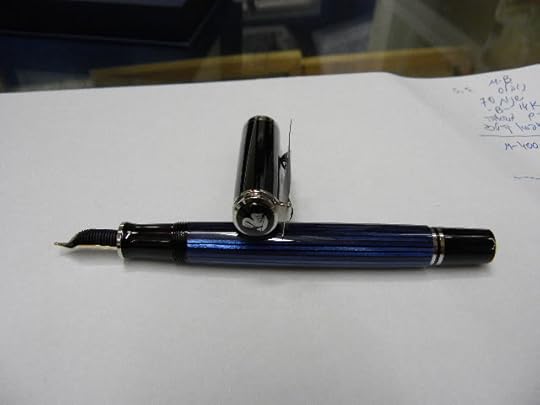
image courtesy of photobucket.com
It was my wife—God bless her—who said I was insane. And not only was I insane, but probably all the people in the world who called themselves writers were too. Certifiable. In need of round the clock psychological care and Thorazine milkshakes.
It was the pens, you see. She was going to the store, and I asked her to pick me up some pens. In my wife’s defense, I didn’t specify what sort of pens. And in my defense, I didn’t think I had to. We’ve been married for fifteen years. She’s seen me write before.
But she brought home black pens. I thought it was a joke at first. I even laughed. My wife didn’t call me insane then, but I bet the thought had crossed her mind.
Blue pens, I told her. I needed blue pens. Because blue ink produced the best words and black ink undermined creativity and the flow of artistic expression. How could anyone not know that? That’s when the insane comment was voiced. Jokingly, of course. Maybe half-jokingly. Which was followed by this:
“The problem isn’t black pens, it’s that you can’t tell the difference between what you want and what you need.”
Of course I disagreed. It’s a pride thing. But as the day wore on and I kept staring at my pack of black pens, I began to see she was right. As a writer, I don’t really have needs and wants. I just have needs.In the beginning there is rarely confusion between the two. When we decide we want to be writers, we just want to write. Life is simple because what we want is exactly what we need. We’re like babies then. And like babies, we believe the world to be both magical and ours.
But then we grow up and decide to get serious about writing. That’s when we realize the world isn’t ours to have as much as it is ours to borrow, and what was once magical can often become downright scary.
Trust me. I was there. Still am, too.
It starts out with needing to tell a story and then evolves into wanting to be published. Then from wanting to be published to needing an agent. It wasn’t that long ago that I told myself if I could only catch Rachelle Gardner’s attention, if she would only be my agent, then I would be a writer. That’s what I needed.
When that happened, I thought I needed a publisher, and when that happened I thought I needed a multi-book contract, and when that happened I thought I needed a bigger multi-book contract, and then somewhere in there my wife called me insane. Because as it turns out, those weren’t needs at all.
There are lessons that can be learned by heeding the experiences of others and lessons that can only be learned through one’s own failure. I’m pretty sure what I’m about to say falls under the latter, but I’m going to say it anyway:
If you are a writer and if you are reading this, you already have the essentials of success. The great secret is that the agents and the publishers and the book deals are just wants. Sure, you should go for them. Shoot for the moon. Dream big. Have faith. But know that being denied a want isn’t nearly as bad as failing to meet a need. Thankfully, as writers our needs are few.
We need a story to tell and a longing to tell that story in the best way possible. We need someone to tell that story to. And we need a determination to get up just one more time than we fall down.
That’s it. Meet those needs, and the wants will come. That’s not to say we’ll never be called insane, even if black ink makes the same words as blue ink. We’re writers after all. We don’t have to make sense all the time. Our hearts are bowed toward the hidden lands.
What do you want? What do you need?
“I dont’ ask writers about their work habits. I really don’t care. Joyce Carol Oates says somewhere that when writers ask each other what time they start working and when they finish and how much time they take for lunch, they’re actually trying to find out ‘Is he as crazy as I am?’ I don’t need that question answered.” — Philip Roth

April 26, 2013
This too shall pass
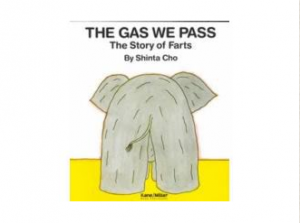
image courtesy of photobucket.com
A few minutes ago a bit of the last forkful of my son’s green beans failed to be broken down into acids and molecules and slipped undigested into his large intestine. There the billions of hungry bacteria sat down to a dinner of their own, finishing the job and sending them off into his bloodstream.
The process resulted in a mixture of methane, hydrogen, and sulfide that was forced downward as pressure and expelled. Right onto the couch cushion beside me. With a rapid and not-so-elegant
squeak!
I didn’t move my eyes from the book I was reading, didn’t even acknowledge it had happened. And to my son’s credit, he didn’t either. Not at first. He kept right on attacking the buttons on his Nintendo DS, and I let him.
Squeak!
I turned the page and without looking said, “Whatcha say, Bud?”
“Scuse me,” he answered.
I nodded and kept reading, thinking the moment had passed. Which it had, technically speaking. But the aftereffects had not, because then another sound escaped from his other end in the form of a muffled snort.
“What’s so funny?” I asked.
“Nothin.”
“Okay.”
Squeak!
I waited an appropriate amount of time—about three paragraphs of my novel—for the required Scuse me, but none came. There was, however, another snort.
And then, Squeak/Snort!
“…Bud…”
“Scuse me (snort!).”
I sighed and resumed reading. In a span of a few short minutes both noises from both places quieted. I offered myself a satisfied nod. It was a victory. Not a decisive one maybe, but complete enough.
I’m unsure at what point this certain bodily function became the holy grail of hilarity to him, but it did. Nothing in the world makes my son laugh as hard as either hearing it, smelling it, or—most of all—doing it.
He knows all the synonyms—gas, vapors, stinker, breaking wind, cutting the cheese, and the ever popular toot. He peppers them into his speech and has entire conversations about them with his friends. I suspect he even eats certain amounts of certain foods just to perform his own unique standup routine later on. Smellivision, I call it. The finale always seems reserved for the bathtub.
Raising a son is hard. Trying to explain why these antics aren’t what a young man should aspire to is harder.
So I sat him down. Said it’s a normal thing that everyone does, but not the sort of thing people should really be talking about a lot. And really not the sort of thing people should devote elaborate performances to. He nodded and yessir’d me and promised to be better.
And he was. Until bath time. His performance that night was somehow even more spectacular than usual.
Another talk. More parental wisdom. He said at the end, “But everybody does it.”
“But everybody should try not to make a big deal out of it,” I answered.
“I bet Jesus tooted.”
“I bet He did, too. I also bet he said ‘Excuse me’ after and then kept right on healing people and stuff instead of laughing and telling everyone how bad it smelled.”
“Yeah,” he said. “He was really good at that.”
Training a child is not unlike training a dog. It’s a long process that requires a lot of patience and a lot of effort. It’s reward and punishment, a firm hand and a loving one. And it’s also a practice best done knowing that while our children will slip from time to time, we do the very same thing.
Thankfully, he’s gotten better with this. Much better. The normal bodily functions are still functioning, but they’re being done so under the polite cover of modesty and discretion. Even in those times when nature plays its cruel hand and delivers multiple ones right after another—as just happened—he’s bent but not buckled. I’m proud of him. I really am.
Just now he handed me a sheet of paper between games on his DS, courtesy of his teacher. The class would be going on their first ever excursion in a week. To the fire department, no less. I scribbled my name at the bottom, giving my permission for him to attend.
“You’ll have fun,” I told him. “Did your teacher tell you what it’s called when you leave school and go somewhere?”
“Yep,” he said. “It’s a fart trip.”
Pray for me.

April 22, 2013
Only a matter of time
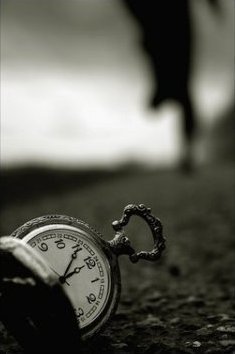
I’m going to die on November 5, 2055. So says the nifty little quiz I just filled out on the internet. And though it’s hard to put much faith in the accuracy of a prediction based in part on how often I recycle (question number five), this is good information to have. Because whether the date is exact or not, the truth of it is.
One day, I’m going to die.
November 5, 2055, does seem reasonable. I’ll be eighty-three years old then, and my children will be in their late forties. I’ll most likely have grandchildren, be retired, and spend most of my days telling everyone who will listen that the world was a much better place back in 2013.
So yes, dying at eighty-three would be okay with me. That’s a good age to smile at this world and wave goodbye, right there in the meaty part between hanging around too long and not long enough.
At least, that’s what I thought. I’m not so sure now. Having forty-two years left for me to finish whatever it is I want to start seems like a lot of time, but it isn’t when you start to dig a little deeper. Trust me. Because that’s what I did.
If the scribbles on the sheet of paper in front of me are right, most of my remaining forty-two years are already spoken for. I’ll spend twelve of them sleeping, three eating, ten either exercising or resting, and another ten just on home maintenance.
All of which leaves me with a grand total of eleven years to live. One hundred and thirty-two months to make a difference.
Not a lot, is it? Especially considering the fact that November 5, 2055 is at best an approximation and at worst a clever marketing ploy designed to deluge me with junk mail. My end may come later. It may also come before I finish writing this. I don’t know.
None of us do.
Which is why it amazes me that we always think there is time. Plenty of time. There’s always tomorrow, we say. And that may be true for some of us. But not for everyone.
About 146,000 people in the world will wake up this morning thinking there’s plenty of time, not knowing this will be their last day in this life. That’s 6,098 people an hour, 102 people every minute, and about 2 per second. In the time it took you to read this paragraph, twenty people have died.
Amazing, isn’t it? Sad, too. Not because our lives must end, but because the thought of death rarely crosses our minds.
Life fools us into thinking it is this hulking, indestructible beast, when it’s really as fragile as a porcelain figurine . It is holy and sacred and fleeting and never guaranteed. Believing otherwise is not only dangerous to us, it’s dangerous to how we live.
The truth? We don’t have plenty of time. Our every breath is the oil that moves the gears of our days, sending us closer to the moment when we say goodbye to this world and hello to the next. We can’t put off chasing that dream. We can’t delay making those amends. We can’t wait to say “I love you” or “I’m sorry.”
We can’t linger when it comes to the things that make living worthwhile, the people and the dreams that give us meaning. We have to take care of them every minute, every moment. Because maybe they or we won’t be here the next.
There is no time for doubts. No time for hate. No time for hanging on when it’s time to let go and letting go when it’s time to hang on. We get one shot at this world, one chance to do something good and right and true. That time isn’t later. It’s now.
Don’t think it’s never too late. Because sometimes it is.

April 18, 2013
Cold feet

No one is happier than I to see spring finally entrench itself into this year. I am not a fan of winter, of cold mornings and colder nights and darkness at four-thirty in the afternoon. Ba. Humbug.
We are in the main course of May now. The robins have returned outside my living room window, the trees in the yard are heavy with leaves, and I’ve cut the grass three times (a magnificent task, by the way. You learn a lot about God by mowing the yard. Another story for another time, though).
But even with sunshine and seventy degrees here in the valley, the tops of the mountains outside my window were clouded in snowfall just a few weeks ago. I was here, winter was there. And as I looked at that cold, angry storm, I knew it also saw me. Snarling, “I can come down there too, you know. I’m not done just yet.”
Which, ironically, was fine. As anxious as I was to put away the snow shovel and bring out my softball bat, I wasn’t so sure I wanted the cold weather to go away. Because even though spring meant birdsong and porch swings and windows-down-radio-up, it also meant I would have to put away my new slippers.
That they had been on my feet daily since Christmas, gently warming my toes and therefore my very heart, is an unlikely thing for me to say. I’ve never been a slipper guy. They’ve always seemed so un-me, so…girly.
Not that there’s anything wrong with that.
When I unwrapped them last Christmas morning, my wife asked me to just give them a try. “Please,” she said, emphasis included. Not because I wanted them, not even because I thought I needed them. But to, in her words again, “Finally get you to shut up.”
I love my wife.
You see, the floors in our home were cold. Very. The frigid temperatures coupled with an unwavering determination to cut down on the gas bill kept our thermostat at a barely tolerable sixty-eight degrees this year. By November, I was chilly. By December, I was a Popsicle.
It was easy enough to throw on a sweatshirt or a thicker pair of jeans to make things a bit more comfortable, but that did little to improve the condition of my feet. I tried wool socks, which did the trick so long as I stayed on the carpet in the living room. Venture out from there and onto the hardwood floors of the rest of the house, though, and it was like an ice rink in both temperature and friction. I almost broke a leg one Saturday afternoon carrying a bag of carrots into the kitchen. Almost died from hypothermia waiting for someone to help me, too.
Stupid house, I thought to myself. Stupid cold house with its stupid cold floors. Why didn’t we buy a house with a fireplace in it? Or two fireplaces. And radiant heat in the floors. Oh, yeah. That would be nice. Radiant heat…
Those thoughts were translated into words later on to my wife: “I hate living here, and I hate our life.”
She looked at me, puzzled. What in the world had brought this on? she wondered. Has something terrible happened? Has he finally cracked?
“What made you say that?” she asked.
“My feet are cold.”
Which brought about an even more puzzled look.
But it’s like that with us, isn’t it? We all have the unique talent of turning small inconveniences into major problems. And while I spent months believing that the source of my trouble was a drafty house, the truth was that it was something much closer.
The trouble wasn’t the cold floors. Not the weather, either.
The trouble was me.
There is a lot in my little world I pray that God will change. “Give me more and give me better,” I ask Him. I wonder sometimes if He’s not saying the thing to me.
I wonder if rather than making the rain stop, He’d rather just give me an umbrella. Because you have to learn to smile in the rain as much as you do in the sunshine.
Or if rather than making me comfortable, He’d rather leave me uncomfortable. Because that’s when I learn the most.
Or if rather than giving me a nice warm house, He’d rather just give me a pair of slippers.
Because there isn’t much you can change about your circumstances sometimes. But there is plenty you can change about you.

April 15, 2013
Mabe Man
 I read an article last week about how scientists are just now getting results from tests they ran on a 126,000-year-old human. Mabe Man, they call him, because he was found near Mabe in China’s Guandong Province.
I read an article last week about how scientists are just now getting results from tests they ran on a 126,000-year-old human. Mabe Man, they call him, because he was found near Mabe in China’s Guandong Province.
Not really the sort of article I would be interested in, but I had some time to kill and it was either that or stare at the wall in front of me. So I kept reading.
I’m glad I did.
Seems Mabe Man had a rough go at it. That in itself isn’t surprising—I would imagine life back then was fraught with all sorts of peril, not the least of which was where to find the next meal. Life expectancy hovered around thirty years. Our place in the food chain was somewhere south of saber-toothed tigers.
When Mabe Man was first discovered in 1958, his bones were cataloged, shoved in a museum basement, and promptly forgotten. It was only recently that he was rediscovered again. Fortunately, science has progressed quite a bit over the last 60 years. There’s a lot we can know about him now that could only be guessed then, and a lot of fancy tests that can help bring out the humanity in our ancestors. Things like a simple CT scan, for instance. When the scientists did just that, what they found was morbidly interesting in the same way as witnessing the aftermath of a car wreck.
To break it down to a level I could understand, Mabe Man had gotten the hell beaten out of him.
His skull had been fractured. Scientists concluded it was the result of blunt force trauma. Not your everyday sort of blunt force trauma, either. This poor guy didn’t receive his injuries by tripping over a rock in some primeval forest. No, he was beaten. The conclusion was that his wounds could have only been given by some sort of clubbed weapon.
The scientists seemed surprised at that finding. Not me. And I doubt that deep down you’re not very surprised, either. Recorded history is full of violence. Full of war and hate and bloodshed. I read once that when all the annals of every nation’s history are combined, what you get is a total of seven years of peace. Seven out of tens of thousands. We’ve always hurt each other. We always will. It’s a basic tenet of the Christian faith—we all sin and fall short of the glory of God.
Mabe Man’s story could end there, but it doesn’t. There’s more. His wounds would have caused excessive bleeding and a severe concussion. Brain damage would have been likely. He was helpless. And 126,000 years ago, being helpless meant you were dead.
But he didn’t die.
His wounds healed.
And not only did they heal, but he lived for years afterward.
Why? Because he was cared for. He was nursed back to health. His wounds were bound and his stomach was filled and he was given shelter.
Scientists seemed even more surprised at that. Mabe Man survived because he was loved.
Me, I find a beauty there, and also a profound truth. It means love has always sought to put back together that which hate has broken. It means that our hands have always been able to heal as much as harm. It means that since the dawn of humanity, each of us contains three people—the angel, the demon, and the one who decides which we will obey. That’s what it means to be human.
That’s a basic tenet of the Christian faith, too.

April 11, 2013
Avoiding Life’s sting
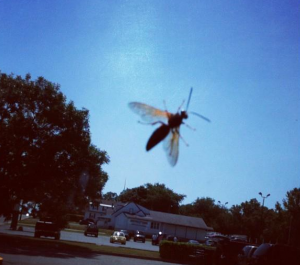
image courtesy of photobucket.com
I see him by the steps as I pull up. Standing there, staring at the door. He’s still there when I park, still there as I climb out of my truck with shopping list in hand. Still there when I sidle up beside him.
“Hey Charlie,” I say.
He turns and looks at me. “Hey.”
“Whatcha doin’?”
“Oh,” he says, “just waitin’.”
“Uh-huh,” I answer.
I decide not to say anything else. I know what might happen if I do, and I know what might happen after that. Because Charlie is one of those people who can start a conversation in the real world and finish it somewhere in the Twilight Zone.
But then I figure what the heck, I have some time to kill.
“You know,” I say, “they’re not gonna bring your groceries out to you. You gotta go in and get them yourself.”
Charlie nods. “Yep,” he says. “I’ll be going in directly. Just gotta wait for it to leave.”
“Gotta wait for what to leave?”
Charlie points to the flying speck of something in front of the door and says, “That.”
I squint my eyes and stare ahead, trying to figure out what I’m looking at. After careful consideration, I decide it’s a bumblebee.
“You’re not going in because there’s a bee in your way?” I ask.
“Yep.” Then he says, “Nope,” just in case he got his words mixed up.
The door swooshes open then as an older woman rolls her grocery cart out, oblivious to the certain death that hovered over her. Charlie winces as she walks past, exhaling only after she was clear of the danger zone.
“You allergic to bees, Charlie?”
“Nope.”
I nod, trying to find the right words to ask him what I need to ask him next. “You, um…you ain’t, you know…afraid of them, are you?”
“Nope.”
I nod again. “Okay, well want me to go get your beer?”
I don’t know for sure that Charlie is here for his beer. He might be low on something else, maybe hamburger or peanut butter or ice cream, because Charlie loves his ice cream. But he loves his beer even more, and I have a feeling that his shaky right hand isn’t completely due to the bee.
“Nah,” he says. “I’ll go. I got the time to wait. Just don’t wanna get stung.”
It’s then that I realized Charlie really is afraid. I’m not convinced that is a bad thing, though. No one likes getting stung by a bee. It hurts. Everyone knows that.
More than that, I realize people do this sort of thing all the time. Myself included. We all eventually realize not just where we were, but also where we want to be. And we realize there is usually some sort of Bad blocking the way. It could be a rejection slip or an unreturned phone call. Could be nerves or insecurity. Could even be the prospect of success after years of failure.
Regardless of what it is, that’s what’s floating between you and it. Between where you are and where you want to go.
The size of what’s blocking your way doesn’t matter either, because the fact of the matter is this—there is risk involved in proceeding further. You could fall. You could fail. You could be disappointed.
You could get stung.
And that hurts. Everyone knows that.
The alternative, of course, is to stay where you are. With practice and dedication you may convince yourself that you’ve gotten this far, which is further than some and maybe even most. That might be good enough. And you might even begin to believe that holding onto the prospect of what you could have done will be good enough.
I could have been a writer. Or a teacher. Or a nurse. I could have gone to school. I could have had that job or that career. But there was this Bad between me and it and, well, things just didn’t work out.
But you know what? That never works.
I know from experience that Could Have is just the same as Never Did.
“I’m gonna go in, Charlie,” I say. Then I look at him. “You know that bee’s gonna fly right out of my way, right? Because I’m bigger than the bee.”
“Yep.”
“Okay, then.”
I leave him there at the door and pick up the few things on my list. Charlie’s still standing there when I head back to my truck.
“Don’t want to get stung,” he says again.
“I know,” I answer.

April 8, 2013
God’s catastrophes
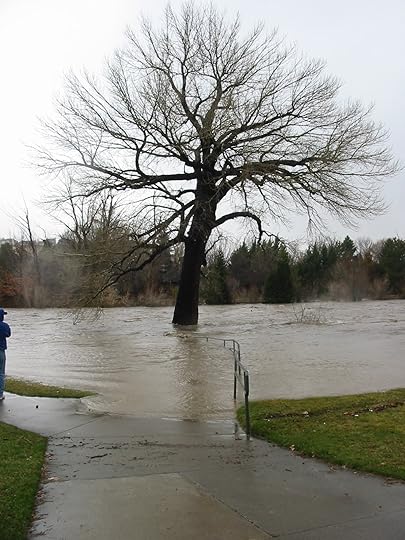
image courtesy of photobucket.com
I suppose you could say it all started for Tommy back when the river took his house. That was six years ago, more or less. Tommy can’t remember if it was six or five. Or seven.
He does remember the house was a bargain—two bedrooms, two baths, 1200 square feet. And then there was the land—ten acres of woods that thinned out right at the river’s edge. Tommy always wanted a place like that, out in the country where everything was slow and the only sounds were the coyotes and the birds.
He settled in and got used to his new life. The divorce had been tough on him (all divorces are), but now the papers were signed and he was ready to move on. Tommy fixed up his new house with some paint and new furniture. Added a deck on the back so he could sit there in the evenings with his dog and watch the water drift by. Tommy said he loved that deck. Sitting there watching that water made him realize that things will always keep moving, that the bad that might be here now will be behind you soon enough.
Tommy was there for three summers when it all happened. It began as a front coming up from the Gulf, welcome news for the farmers and their dry fields. The weatherman said the next two days would be wet ones and that we should all spend the time sharpening the blades on our lawnmowers. Tommy didn’t do that. He couldn’t sit on the deck and watch the river, so he pulled the recliner around toward the window and watched it from inside.
Watched it rain. Then pour. And then the pour became a deluge.
The weatherman said the system stalled over the mountains, churning in a big circle the kept dumping water onto the valley. It rained nonstop for those two days. We all felt like Noah.
By the end of the first day, the river was swollen. By the beginning of the second, water was spilling over the banks. By mid-day, Tommy’s house was gone.
He managed to get out the most important things—pictures of his kids, his dog, the motorcycle. The rest was soaked or swept away. Including the deck, which was soaked while it was being swept away.
Tommy thought his new life would be better than his old one. But as he stood in what was once his front yard a week later, he figured he thought wrong.
There was little doubt in his mind it was God’s doing. The Lord sent the rain, the Lord kept the rain there. The Lord watched as Tommy’s house ended up floating down the river. It was His will, Tommy thought. Had to be. Because if it wasn’t, then that meant the rain was bigger than God. Tommy hadn’t been to church since he was a boy, but he said he knew enough to know God was bigger than the rain.
He knew enough to realize as well that if God allowed all that to happen, it must have been for a reason. I think that’s what kept Tommy going in the months that followed. The insurance check arrived. He used it to buy another house, this one with no river in sight. He settled in once more, with new furniture and new paint (not a deck, though, as this house already had one). Things started looking up. Tommy considered it the start of his third life, and he was glad to be putting the first two behind him. Somewhere in the midst of all that newness, Tommy did something else. He took a drink.
He’d never held much fondness for alcohol. A beer at the ballgame and maybe a shot of liquor during poker with the guys, but nothing else. To hear him say it, Tommy still can’t explain why he decided to pick up a six-pack at the 7-11 that day. He just did. And wouldn’t you know it, the last one tasted even better than the first.
Like I said, that was six years ago. More or less. Tommy can’t remember.
And as it turned out, his third life was even worse than his previous two. He lost his job because of the drinking, which has also started to affect his health—“Can’t have a beer without a smoke,” he often says. He spends his days sitting on the sofa with his dog watching television. The Price is Right is his favorite.
I guess that’s how it goes with some people sometimes, sad as it may be.
Tommy says it’s all God’s fault for sending that stupid rain. It was a catastrophe, he says, and there’s little doubt it was.
But he’ll also say the drinking was his idea. God didn’t have anything to do with that. Which is why I think the catastrophes that God sends are ones we can overcome. It’s the ones we send upon ourselves that we crumble under.

April 4, 2013
Life after Art
 I don’t often use this space to review books, but it isn’t often that I read something that makes me think, Yes, THIS is what I’ve always felt—THIS is what I’m trying to say. The book I found waiting in the mailbox one day last week did just that. So much that I didn’t have a choice but to write about it.
I don’t often use this space to review books, but it isn’t often that I read something that makes me think, Yes, THIS is what I’ve always felt—THIS is what I’m trying to say. The book I found waiting in the mailbox one day last week did just that. So much that I didn’t have a choice but to write about it.
I’ve known Matt Appling for quite some time—one of those people you meet over the internet but never in person, whose words you read but whose voice you never hear. He’s a smart guy, a funny guy, and a guy who knows more than one thing about faith. But I never knew he was an elementary school teacher, and I never suspected he taught art.
All of that made his book, Life After Art, such a pleasant surprise.
Because, you see, we are all artists in some way. We are all creators of something. Back in elementary school, this is something we all understood on a fundamental level. Put a crayon in our hands, we knew what to do with it. And more, we understood the power of it. There was something awe-inspiring in taking a blank sheet of paper and producing something where nothing had been. And there was nothing more satisfying than knowing some special part of us had been imprinted on that something forever, long after we were gone.
Matt understands that. In fact, that’s the central premise of Life After Art. But much of the book is spent remedying all the lies we’ve told ourselves ever since art class, namely that our artistic days are behind us.
And why not? Who has time for art—for creating—when there are so many other things vying for our attention? Kids. Jobs. Bills. Dreams, whether real or imagined. No wonder anything other than keeping our heads above water gets placed aside, relegated to the periphery of our lives.
But that’s not the way it should be. And in fact, ignoring that very basic quality makes us less human and more separated from God. Creativity, no matter how it is expressed, is one of the purest forms of love for the divine. And our idea of beauty, no matter what it is, is one of the best ways to define the people we are.
But our idea of beauty has shifted over the years. Nowadays, art seeks to put down rather than lift up, and shock instead of inspire. That’s why, in Matt’s words, “We have an epidemic of addiction to the cheap, ugly, and disposable.”
Life After Art goes a long way in repairing such thinking. It’s a fresh reminder of the great truth many of us have forgotten—we are all creators. If not of words or songs or paintings, then of our own lives.
And perhaps the question Matt asks is the one we should all ask ourselves:
What is my life creating: beauty or ugliness?

April 1, 2013
The luckiest boy in the world
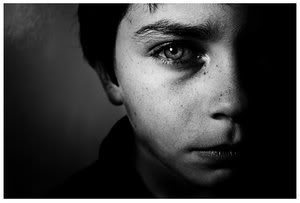
image courtesy of photobucket.com
I’ve seen the boy a few times when I pick my kids up from school, just a little thing, no taller than my waist. Why he stood out to me among the throng of other elementary-aged children I can’t say, though I suspect his demeanor helped.
No hollering from this boy. No running down the halls, no smile. Not even (as far as I could tell) friends. Just him, walking by his lonesome into the cafeteria every afternoon where parents waited to pick their kids up and spare them from a bus ride home.
The school is home to what is generally known as the poor children in town. There is evidence for this fact—dirty faces, oversized clothes, undersized clothes, and a plethora of emotional problems due to meager home lives. They are good kids in bad situations, unaware they were born with a strike or two against them.
Like the boy. He of the bushy, unkempt hair and the backpack with holes so big everything from pencils to notebooks comes tumbling out. A worn and faded sticker is slapped over one hole. The name JEFF is stenciled there. I wonder if it’s there as a patch or so Jeff can better keep track of his belongings. Or, perhaps, to help remind him of who he is.
Jeff snakes his way through the lunch tables toward his waiting mother. Her smile is not reflected in his face. He looks tired. All the kids do, mine included, but Jeff especially so. He does not hug his mother, simply stands there looking at her feet. She rises from her chair and guides him to the door with her hand. They are gone.
A week later and there is Jeff again, plodding into the cafeteria. I notice his hair hasn’t been combed since the last time I saw him. His eyes keep to the small amount of space just in front of his feet. His backpack is empty. I wonder if that’s because he has no homework or because of the holes. His mother is absent this time, replaced by an older woman I take to be his grandmother. Jeff does not hug her, though she hugs him. Then she guides him to the door with her hand. They are gone.
It was the same three days later except it was neither mother nor grandmother, but a man. His father, I wonder. But then I see the man does not guide Jeff to the door with his hand, he simply gets up and lets Jeff follow. I decide no, perhaps not his father. Perhaps someone else.
That night, I ask my wife about Jeff. She teaches at the school, knows most everyone, but she can’t place him. I ask my kids. They, too, don’t know him.
I’m sitting in the cafeteria the next day, waiting along with thirty or so other parents for the final bell to ring. I notice Jeff’s mother sitting to my right, a few empty seats between us.
I lean over and say hello, which is returned with a smile that seems a bit forced. We spend the next few moments making small talk about the weather and my hat.
I say, “You’re Jeff’s mother, right?”
“Yes.” She looks as if she’s waiting for me to ask something else. I don’t. “He’s a middle child. Middle children have it harder sometimes, I think.”
“I’ve heard that,” I tell her. “So he has two other brothers or sisters?”
“No,” she says. “Well, yes. I suppose, in a way.”
I wonder how a mother could not know how many children she’s had.
“You see, his father and I are divorced. We had three children, including Jeff. His father remarried and has four step-children.”
“Oh. So there’s—”
“—Seven,” she says. “Yes. I talk to Jeff all the time about how great he has it. He stays with me unless I’m working nights. I do that some. He’ll stay with his grandma if I am. And then he goes to his father’s on the weekends. It’s nice. Jeff has three bedrooms. Can you imagine? I tell him he’s the luckiest boy in the world.”
The bell rings. Children everywhere, including mine. Including Jeff. He approaches with is holey backpack and his unkempt hair. I see the clear sunshine in the other children’s eyes and the dark rain in his.
He looks tired. All the kids do, mine included, but Jeff especially so. He does not hug his mother, simply stands there looking at her feet. She rises from her chair and guides the luckiest boy in the world to the door with her hand.
They are gone.




